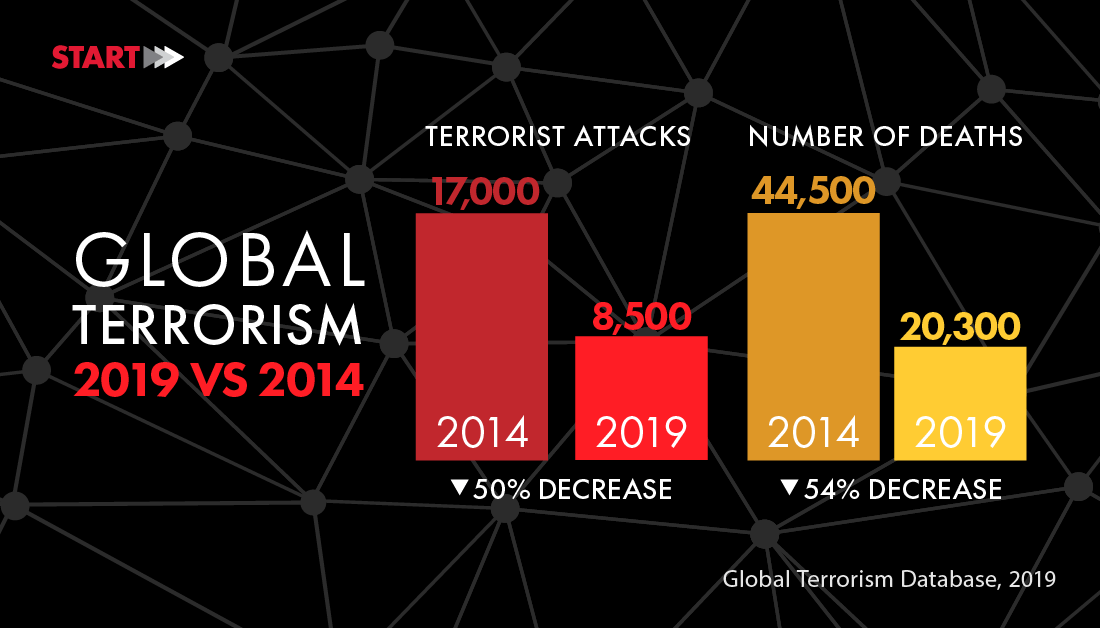- July 09, 2020
- By Maryland Today Staff
Terrorist violence around the world dropped for the fifth straight year, heavily driven by declining attacks in Iraq, according to a report today from the National Consortium for the Study of Terrorism and Responses to Terrorism (START). However, the University of Maryland-based center also found that a pair of exceptionally lethal mass killings in the United States and New Zealand led to an increase in deaths from racially and ethnically motivated terrorism.
The report is based on new data from START’s Global Terrorism Database, which contains information on more than 200,000 terrorist attacks around the world since 1970. In sum, nearly 8,500 attacks worldwide killed about 20,300 people last year, down from nearly 23,000 people in 2018. Compared to 2014, when terrorist violence peaked at about 17,000 attacks and over 44,000 deaths, 2019’s death toll was 54% lower.
 In Iraq, which led the world in terrorist bloodshed earlier in the decade, attacks last year fell 54% compared to 2018 as the Islamic State’s influence continued to dissipate inside the country. The current global hot spot for terrorism—Afghanistan, which experienced 21% percent of all attacks and 41% of terrorism deaths in 2019—saw a 16% drop in fatalities from the year before. However, the report points out that this was because more attackers survived compared to 2018; the number of overall victims fell only 2%.
In Iraq, which led the world in terrorist bloodshed earlier in the decade, attacks last year fell 54% compared to 2018 as the Islamic State’s influence continued to dissipate inside the country. The current global hot spot for terrorism—Afghanistan, which experienced 21% percent of all attacks and 41% of terrorism deaths in 2019—saw a 16% drop in fatalities from the year before. However, the report points out that this was because more attackers survived compared to 2018; the number of overall victims fell only 2%.
Terrorist attacks in Western Europe dipped to 191 in 2019 from 203 attacks in 2018, continuing a trend of decline since 2015. The record was mixed in Africa, where a decline in attacks by Fulani extremists led to a decrease in terrorist violence in Nigeria. But the Boko Haram group carried out more attacks in Nigeria as well as in Cameroon, Chad and Niger.
The deadliest attacks of 2019 took place on Easter Sunday in Sri Lanka, where more than 250 people were killed and 500 more injured by suicide bombings of crowded hotels and churches—attacks for which the Islamic State claimed responsibility.
A U.S. attack aimed at Hispanic people at a Walmart in El Paso, Texas, combined with a deadly assault on Muslims at a mosque in Christchurch, New Zealand, led to a steep increase in deaths worldwide from attacks specifically motivated by race and ethnicity. At least 86 people were killed in such attacks in Australasia, North America, and Western Europe in 2019, compared to 52 in 2018, START reported.
“The increase in the lethality of these attacks seems to be something that is a marked trend,” report author Erin Miller, manager of the Global Terrorism Database, said today in an online discussion of the report. “Many of the attacks … are motivated by white supremacy, xenophobia in particular, and also in particular, anti-immigrant beliefs.”
In the United States, 51 people died in 64 terrorist attacks in 2019, down slightly from the 67 attacks in 2018. Of 10 lethal incidents, perpetrators included white supremacists/nationalists, anti-Semitic extremists linked to the Black Hebrew Israelite movement, an al-Qaida operative in the Arabian Peninsula and a conspiracy theorist extremist. Most attacks were non-lethal, with a broad mix of ideological underpinnings: antifascist, antigovernment, anti-LGBT, anti-Muslim, anti-Semitic, anti-white, left-wing, pro-choice and white nationalist/extremist, the researchers said.
The report pointed out that in deadly U.S. attacks since 2015, 95% of deaths were from firearms.
“What the United States lacks in clarity in terms of perpetrators, it makes up for in the lethality of weapons,” Miller said.
Topics
Research